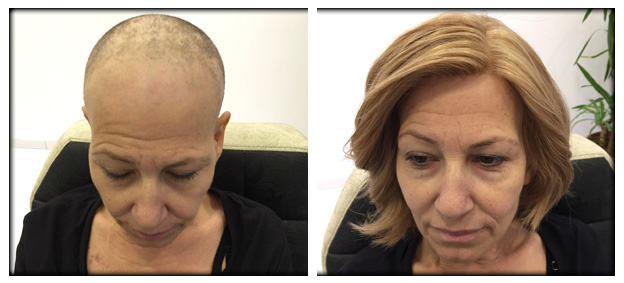Hair Loss Due To Chemotherapy

Chemotherapy and Hair Loss
Hair usually starts to be lost 2-4 weeks after the treatment starts. It may be lost very rapidly in groups or gradually. Hair loss will continue until the end of your treatment and a few weeks later. It depends on your treatment regardless of the fact that whether your hair is absorbed or completely becomes bald. Cancer patients are informed about the fact that hair loss is a challenging adverse effect of the treatment. It may take a few weeks for your hair to heal and start to re-grow after completion of the treatment. When your hair begins to grow, it will probably be a little different than the hair you lost. However, such difference is usually temporary. The color of your new hair may be different. It may be curly as before, or the cells that control the pigment in your hair may be gray until they start to function again.Can hair loss be prevented?
There is no treatment guaranteeing that your hair will not be lost during or after chemotherapy treatment. The best method to cope with upcoming hair loss is to plan ahead and focus on making yourself feel comfortable with your appearance before, during and after your cancer treatment. Several treatments have been researched as possible methods to prevent hair loss; however, none of them has definitive effects, including those specified below: Scalp hypothermia (cryotherapy): Ice packs or any similar devices are placed on your head during your chemotherapy infusions in order to slow down the flow of blood into your scalp. Thus, chemotherapy drugs are less likely to affect your hair. In coseqence of any studies, carried out with respect to scalp hypothermia, it has been determined that it is functioned for the most of people tested. However, such procedure also causes the risk of the recurrence of cancer in your scalp since this region does not receive the same amount of chemotherapy as the rest of your body. People suffering from scalp hypothermia feel cold and headache in an uncomfortable manner. Hair loss cannot be not prevented or controlled in general; however; it can be managed. Follow the following steps throughout your treatment in order to minimize the disappointment and anxiety due to hair loss.Before Treatment
Be gentle with your hair. Dry your hair with air as much as possible and avoid heaters (e.g. blow dryers). Think about cutting your hair. Short hair tends to look more voluminous than long hair. If your hair is lost, it will not be noticed so much when you have short hair. Now, it is the time to start thinking about wigs, scarves or other hair accessories.During Treatment
Continue your soft hair strategies throughout your chemotherapy treatment. Use a soft hair brush. Wash your hair as often as necessary only. Think about using a gentle shampoo. You can think of shaving your head. Some people have a sensitive scalp, and the scalp may be itchy during the treatment, and this can be uncomfortable. Some people state that they feel their hair loss during the treatment. Shaving your head can reduce irritation and prevent shame due to hair loss. Protect your scalp. If your head will be exposed to the sun or cold air, then protect your head by means of sun cream or head scarf. Your scalp can be sensitive during the treatment; therefore, excessive cold or sunlight can easily irritate your scalp.After Treatment
Continue your hair care gently. The new hair growth stage should be particularly protected from any damages that are caused by styling products and heating appliances. Do not have your new hair dyed until it gets stronger. Such dying process may damage your new hair and irritate your delicate scalp.
Hemen Bilgi Al!
Formu doldurarak bilgi talebinde bulunabilirsiniz.
